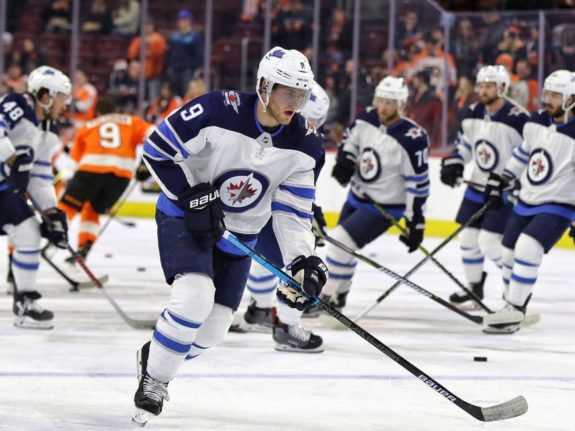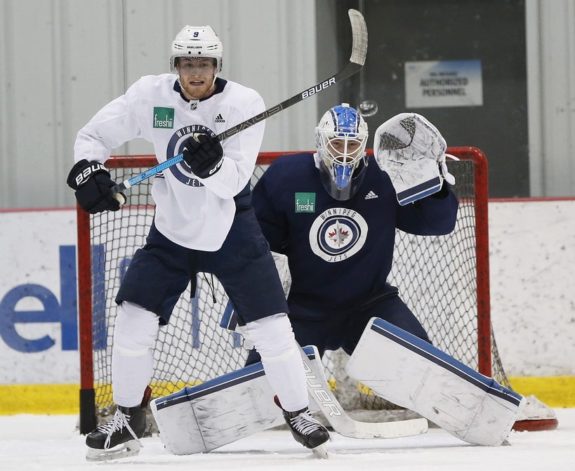Following a season where he posted career highs in goals (15), assists (24), and points (39), Andrew Copp is back for another season with the Winnipeg Jets. Signing a one-year contract worth $3.64-million and avoiding arbitration, the former fourth-round pick has earned himself another year to prove his worth as a two-way forward.
Playing in all but one game during the pandemic-shortened season, Copp put up his best offensive numbers in a significantly smaller sample size, something the Jets evidently took notice of heading into the offseason. While some fans may question why a jump in production would only lead to a one-year extension, NHL teams continue to combat a flat salary cap, which is likely the culprit behind the smaller extensions we’ve seen as of late.
Given the current financial state of the league, there is a strong possibility that Copp will quickly force his way out of the Jets’ budget, if his latest season is a sign for things to come. Kevin Cheveldayoff and company could simply use Copp’s one-year deal as an “in-house rental” before he walks in free agency the following summer.
On the flip side, a one-year deal isn’t exactly a bad thing. The Jets are bringing back a staple in their top nine and a much needed two-way presence, and fans should note that the team has consistently tried improving from within prior to looking elsewhere (think Kristian Vesalainen and Jansen Harkins, who both earned playing time this past season).
The fan base seems to be split on what this one-year deal means moving forward, so here are the two most likely scenarios breaking down what this contract means for Copp and the Jets.
Scenario #1: A One-Year Deal Opens the Door for a Better Contract Next Season
Like I said, a one-year deal isn’t exactly a bad thing. While some may see it as a “last dance” situation, a one-year contract gives both sides more time to come to a more effective solution. Sometimes, it works out. Players who can exceed expectation on an expiring contract often earn a significant raise the following year. Other times, it doesn’t work out, as players who struggle just before hitting free agency can find themselves taking significant pay cuts.
In this particular scenario, the same logic can be applied for Copp and the Jets. Winnipeg already knows what they’re getting in Copp, who’s been with the organization ever since he was drafted out of the University of Michigan. A strong, two-way forward with some offensive upside, but who tends to emphasize defense and physicality.

Last season, Copp elevated his offensive game, while still maintaining a consistent effort in his own end. He showed flashes of the player he could potentially become, and a one-year contract incentivizes more consistency in that regard.
Here, the Jets are taking a low-risk move with the hope that Copp continues his upward trajectory. If he does, there will likely be a contract offer with more stability waiting for him at season’s end. If he doesn’t, the Jets always have the option to look elsewhere or re-sign him to a cheaper, more team-friendly contract.
With Copp poised to hit unrestricted free agency next summer, a one-year deal allows for the possibility of a lengthier extension when the time comes.
Scenario #2: The Jets Get the Most Out of Copp Before His Inevitable Departure
Scenario 2 is one that Jets fans are not going to like as much. With Kevin Cheveldayoff and his team pressed right up against the ceiling when it comes to salary cap constraints, there is a strong possibility that Copp has already pushed his way out of Winnipeg’s budget.
Looking ahead to 2022, the Jets will have five restricted free agents in need of a new contract. Vesalainen and David Gustafsson will likely be cheap, but both will undoubtedly ask for raises following their entry-level contracts. Pierre-Luc Dubois, depending on how his season transpires, won’t be cheap either, and Harkins will likely be brought back into the fold given what he’s been able to do in shorter stints and the similar parallels between him and Copp.
Even if Sami Niku (RFA) and Nathan Beaulieu (UFA) walk, it’ll still leave both Copp and Paul Stastny without contracts. With the league’s salary cap only projected to increase by $1 million from where it currently is, there just doesn’t seem to be enough financial resources for everyone in need.

For Copp, this scenario means that this season will likely be his last in a Jets uniform. A one-year contract allows him to look for a team with more dollars available, and perhaps a bigger role for him to fill once he gets there. Time and time again, we’ve seen players opt for bigger roles with more financial stability when they hit free agency, and should Copp continue his increased production, he’ll undoubtedly join that growing list.
On the other hand, the Jets may have used a one-year contract simply to get as much value out of Copp as they can. Remember, this is a team in “win now” mode, a narrative that has been encouraged based off of their recent offseason acquisitions. Signing Copp to a one-year deal allows them to use him as a rental, instead of spending assets at the deadline to acquire someone else.
Copp Extension Was Best Case Scenario for Both Sides
As unfortuante as it may sound, a one-year extension may as well have been the best case scenario for both Copp and the Jets. While being an incredibly effective two-way player, he hasn’t exactly earned a multi-year contract with significant financial commitment just yet. The Jets were wise not to commit a significant amount of resources to a player who has only shown flashes of his true potential.
Regardless, Copp certainly has the potential to earn that coveted multi-year contract, and if this past season was any indication, there will be plenty of offers once he hits the open market. For the Jets, not overspending on someone like him while also keeping the door open for a lengthier extension was smart in its own right, and both sides could easily come away winners following the upcoming season.
What do you think of Copp’s overall potential? How has the salary cap influenced the Jets’ plans? Let me know in the comments.